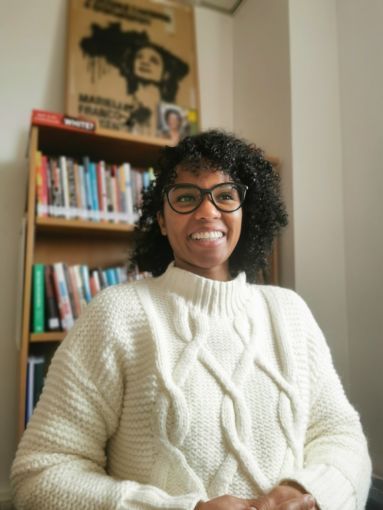
AQUALM Critical Race Qualitative Methodologies
This Advanced Qualitative Methods training is open to all ESRC and non-ESRC funded students within the seven WRDTP partner institutions. Students are welcome from all seven interdisciplinary Pathways.
Orderings of race and racialization as produced under colonial rule are not remnants of the past. They continue to shape our political and social lives, even within post-colonial societies. Ideas about race are also contested and constantly renegotiated at the level of knowledge production. The question is how to frame those elements in research methodology?
Our workshop will address the methodological considerations to conceptualise, design and disseminate research projects, drawing from Critical Race Studies, Decolonial Studies, Black Feminism, Indigenous Studies, and Palestine Studies. The session will invite students to create a field of inquiry that bridges their research topic with the key literature in order to provoke a reflexive exercise around the terms in which we are producing knowledge.
Students will gain insight into the key elements of methodological design, the relational aspect between methodology and knowledge production, positionality and the implications of power relationships during and after the research is submitted.
-
Speakers
I am a Lecturer in Race and Decolonial Studies (UoE) with national and international experience working with the intersections of racialisation politics and race, multiples constructions of gender, formations of nation and nationality, migration, Black diaspora, discourse and affective economy. My background is rooted in the Black Movement in Brazil, samba community and quilombo territory. I believe in the transformative power of education to create means to organise and develop strategies in promoting social justice and societies with loving, ethical and liberating experiences.
My research and teaching examines formations of race and racialization across law, social regulation, and settler colonial nation building. I enter these fields of inquiry through epistemological and methodological considerations, two of which have been central in my scholarship and teaching: First, how do we account for the continuity of race and racial violence as it changes in grammar and political form? Second, how do displaced and dispossessed communities make claims to life under on-going processes of social death and exclusion? These two questions have given shape and content to my research program which engages with race and decolonial thought across multiple field sites and scholarly field debates, some of which include: The building of the ‘Museum of Tolerance, Jerusalem’ on top of Mamilla Cemetery, a Muslim burial ground in Jerusalem (see ‘Necronationalism: managing race, death and the nation’s skeletons,’ Social Identities: Journal for the Study of Race, Nation and Culture); The epistemic tensions within securitization studies in addressing anti-immigrant racism and the securitization of immigration (see ‘Uninhibited Violence: race and the securitization of immigration,’ Critical Studies on Security); The state of the field of socio-legal studies in Canada and its engagement with race and colonialism (‘Race and Colonialism in Socio-Legal Studies in Canada, forthcoming), and the racial politics of humanitarianism and return in the early years of Palestinian expulsion (see ‘1948 to 1951: The racial politics of humanitarianism and return in Palestine,’ Oñati Socio-Legal Studies, 2020).
Recommended pre-reading (please dip into this reading before attending this workshop. It is not necessary to read everything).
Collins, P. H. (2000), Black Feminist Thought: Knowledge, Consciousness, and the Politics of Empowerment. New York, London: Routledge. Part 1: The Social Construction of Black Feminist Thought (chapters 1 and 2)
Nayak, S (2017), ‘Location as method’ , Qualitative Research Journal, 17 (3) , pp. 202-216. Available at: http://dx.doi.org/10.1108/QRJ-02-2017-0004
Smith, L. T. (1999), Decolonizing Methodologies: Research and Indigenous peoples. London: Zed. Chapters 3 (Colonizing Knowledges) and 7 (Articulating an Indigenous Research Agenda).
Al-Hardan, Anaheed. “Decolonizing Research on Palestinians: Towards Critical Epistemologies and Research Practices.” Qualitative Inquiry 20, no. 1 (2014): 61-71.
Barakat, R., 2017. Writing/right Palestine studies: settler colonialism, indigenous sovereignty and resisting the ghost(s) of history. Settler Colonial Studies[online], 8(3), 349-363.
Forrest, A and Nayak, S 2020, ‘‘Should I stay or should I go?’ Group-analytic training : inhabiting the threshold of ambivalence is a matter of power, privilege and position’ , Group Analysis.
Maldonado-Torres, N. (2017). “The Decolonial Turn.” In: Juan Poblete (ed) “New Approaches to Latin American Studies: Culture and Power”. London:Routledge, 2017. 111-127.
Mignolo, Walter D. Epistemic Disobedience, Independent Thought and De-Colonial Freedom. Theory, Culture & Society, Vol. 26 (7-8): 1-23.
Pihama, L., Smith, L. T., Evans-Campbell, T., Kohu-Morgan, H., Cameron, N., Mataki, T., . . . Southey, K. (2017). Investigating Māori approaches to trauma informed care. Journal of Indigenous Wellbeing, 2(3), 18-31
Smith, G. H., & Smith, L. T. (2018). Doing indigenous work: Decolonizing and transforming the academy. In E. McKinley, & L. T. Smith (Eds.), Handbook of Indigenous Education (pp. 1075-1101). Singapore: Springer. doi:10.1007/978-981-10-1839-8_69-1
Shilliam, R. (2018) Black/Academia, in Bhambra, G. K., Gebrial, D. and Nişancıoğlu, K. “Decolonising the university. London: Pluto Press.
Said, Edward W (1979). Orientalism. London: Penguin, Introduction (p. 1-28).
This training session will be delivered via Blackboard Collaborate.
PLEASE NOTE: Our online training sessions will be recorded and will be available on the VIRE in an edited format for those students who cannot attend. If you wish to join this session but do not wish for your contributions to be included in the edited VIRE resource, please ensure that you select NO when prompted in the online booking form regarding recording.










